
Alex Nitkin is The Daily Line’s reporter covering Cook County and Chicago land use policy. He came to TDL from The Real Deal Chicago, where he covered Chicago real estate news. He previously worked at DNAinfo, first as a breaking news reporter, and then as a neighborhood reporter covering the city's Northwest Side. Nitkin graduated from Northwestern University’s Medill School of Journalism with a bachelor’s degree.
Bio
Solutions reporter, @IllinoisAnswers/@BetterGov. Formerly of @thedailylinechi, @trdchicago & @DNAinfoChi. Amateur baker. Tips: [email protected]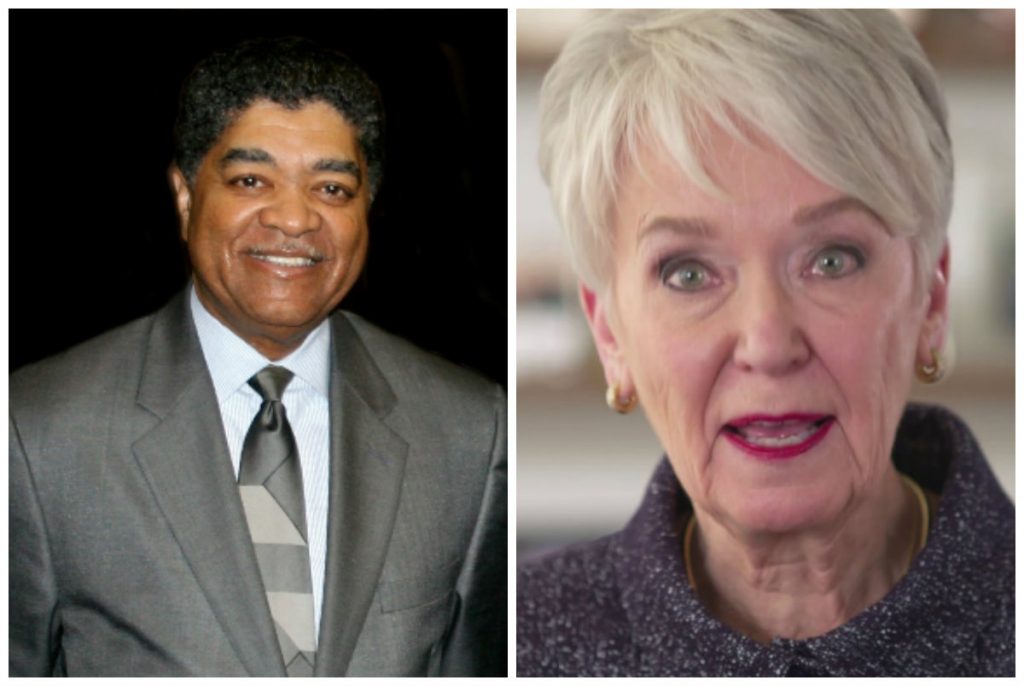 Cook County Circuit Court Clerk Tim Evans, right, and challenger Lorna Propes. [Submitted]
Cook County Circuit Court Clerk Tim Evans, right, and challenger Lorna Propes. [Submitted]
Judges set to vote Thursday on whether Chief Judge Evans keeps his job
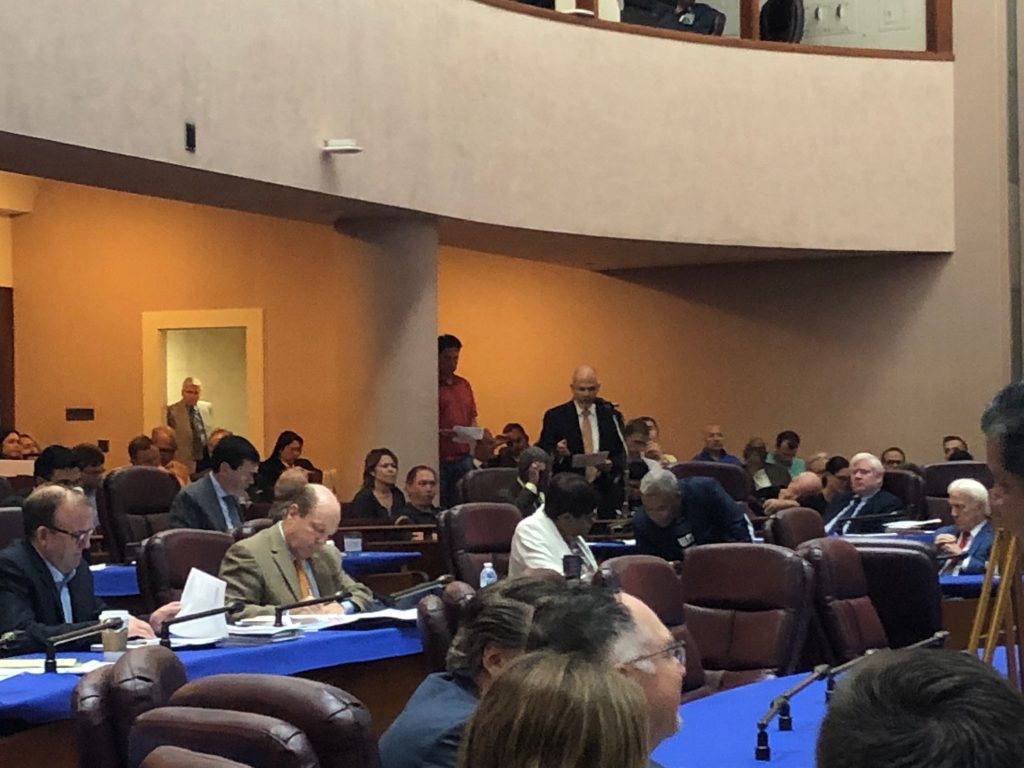
Roger Romanelli, of the Fulton Market Association, urged aldermen to rethink the changes to allow more community input. [Alex Nitkin/The Daily Line]
Aldermen on Tuesday advanced a sweeping initiative that would open the door for some offices and retailers to move into the industrial area west of Fulton Market, despite protests from some business owners who called the plan overly restrictive.
The changes (O2019-5606) were first proposed last year by the city’s Department of Planning and Development under former Mayor Rahm Emanuel as a way to invite more businesses into the Kinzie Industrial Corridor, which is bounded by Ogden Avenue, Sacramento Boulevard, Lake Street and Grand Avenue, while maintaining the area as a predominantly industrial zone.
Aldermen advance Kinzie Corridor changes, defend 'protected area' for industrial businesses
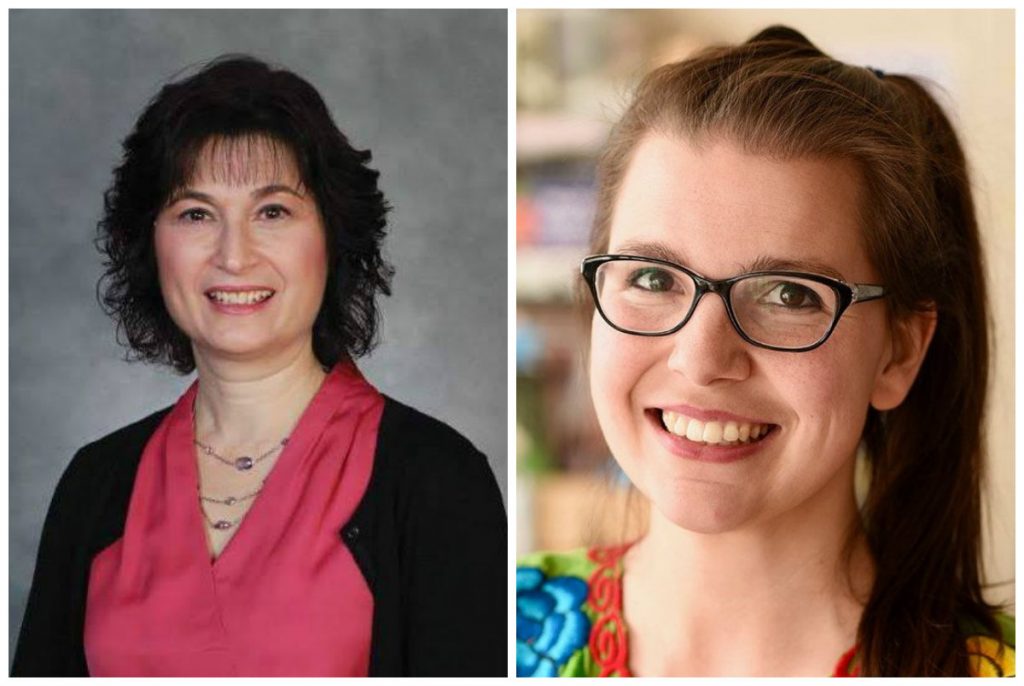 Ald. Debra Silverstein, right, and Halle Quezada. [Submitted]
Ald. Debra Silverstein, right, and Halle Quezada. [Submitted]
Debra Silverstein takes helm of 50th Ward Democratic Party as challenger emerges
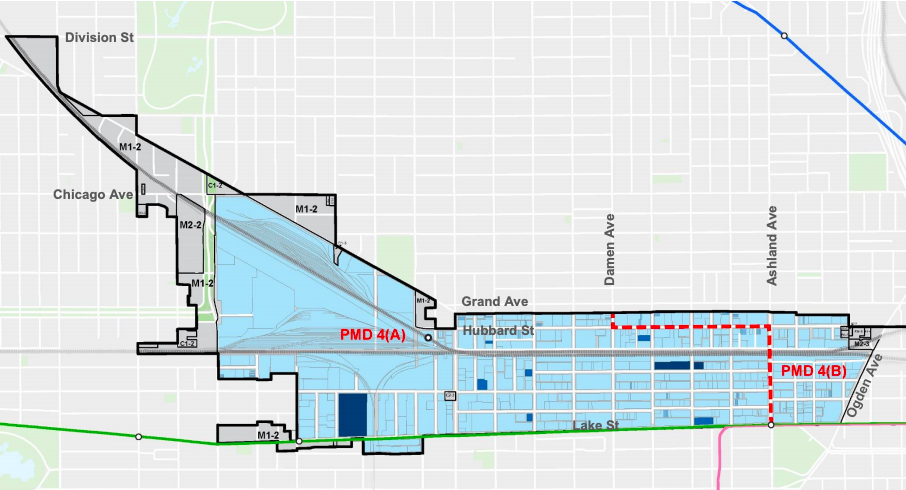 A map of the Kinzie Industrial Corridor. [City of Chicago]
A map of the Kinzie Industrial Corridor. [City of Chicago]Plan to revamp Kinzie Industrial Corridor set for key vote
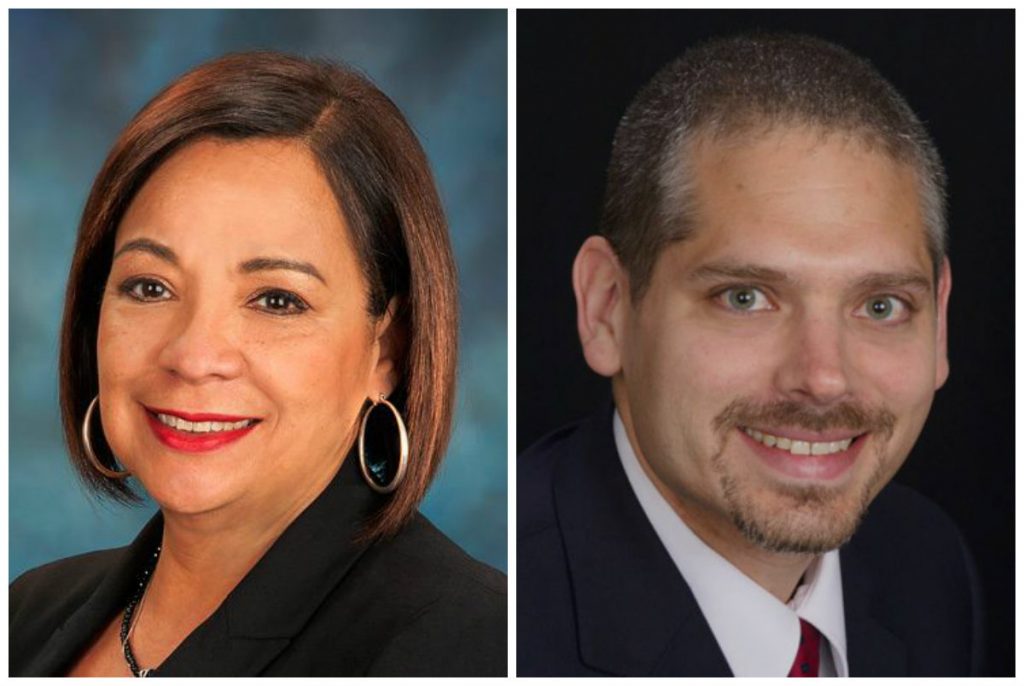 State Sen. Iris Martinez (D-Chicago), left, 33rd Ward Committeeperson Aaron Goldstein. [Submitted]
State Sen. Iris Martinez (D-Chicago), left, 33rd Ward Committeeperson Aaron Goldstein. [Submitted]
Iris Martinez bid for committeeperson ‘revenge’ on behalf of Mell clan: Goldstein
Commissioners tussle over $16.4M taser contract for Cook County Sheriff's deputies
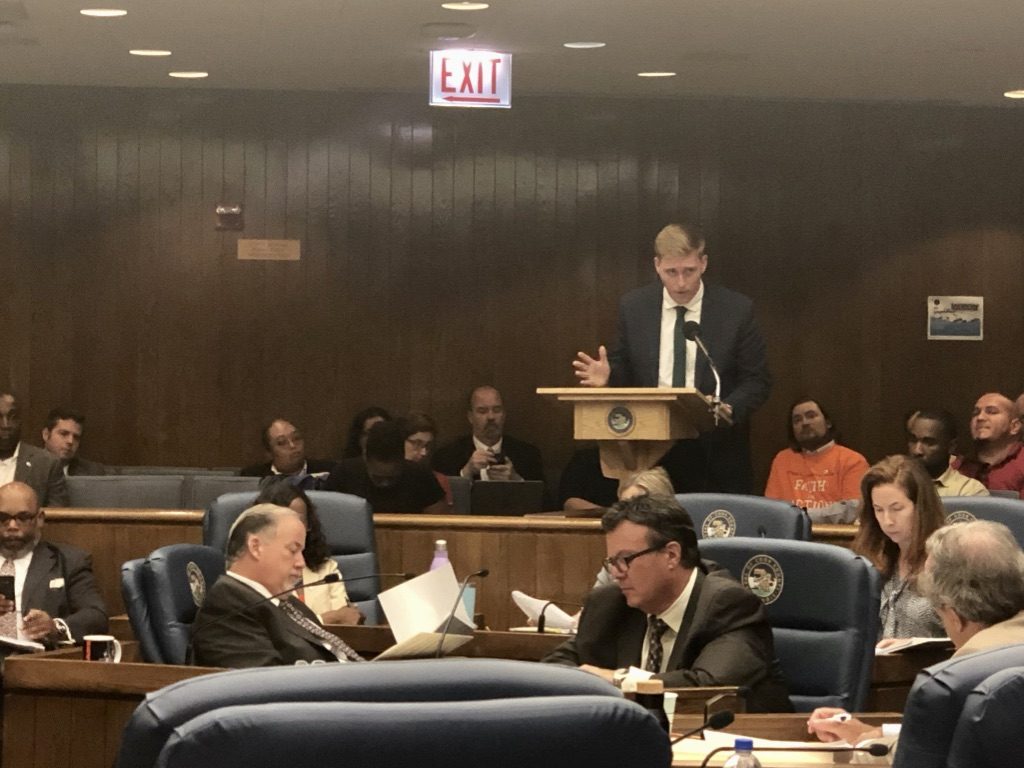 Tom Benedetto, legislative analyst with the Chicagoland Apartment Association, urges commissioners to give landlords more leeway in denying rental applications. [Alex Nitkin/The Daily Line]
Tom Benedetto, legislative analyst with the Chicagoland Apartment Association, urges commissioners to give landlords more leeway in denying rental applications. [Alex Nitkin/The Daily Line]
Tenant, landlord groups spar over implementation of 'Just Housing' ordinance
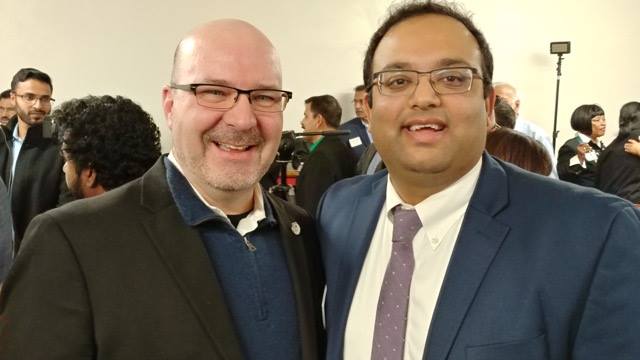 Robert Murphy, right, and Ram Villivalam celebrate in January when Villivalam took office as the first Asian American state senator. [Robert Murphy/Facebook]
Robert Murphy, right, and Ram Villivalam celebrate in January when Villivalam took office as the first Asian American state senator. [Robert Murphy/Facebook]
Murphy to resign as 39th Ward committeeperson, Villivalam set to take over
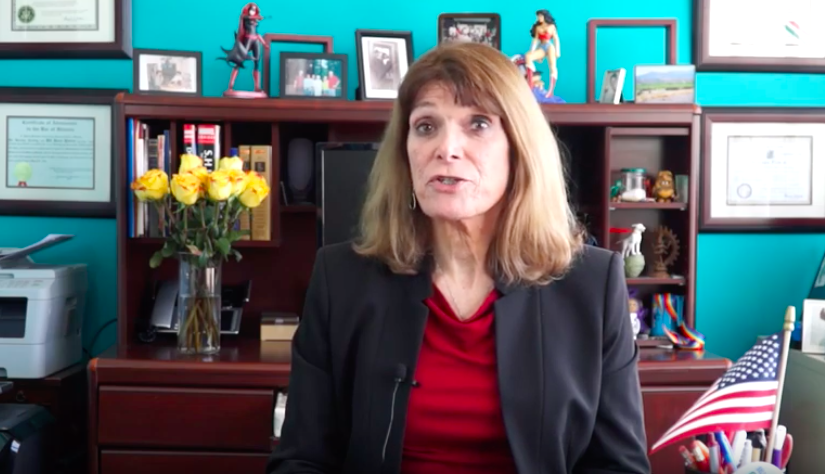 Attorney Jill Rose Quinn recorded a video in response to anti-transgender remarks by President Donald Trump and former State Rep. Jeanne Ives (R-Wheaton). [Courtesy Jill Rose Quinn]
Attorney Jill Rose Quinn recorded a video in response to anti-transgender remarks by President Donald Trump and former State Rep. Jeanne Ives (R-Wheaton). [Courtesy Jill Rose Quinn]
During an impromptu press conference called to announced the results of the party slating session, State Sen. Don Harmon, who is also the Democratic committeeman for Oak Park Township, read 13 names off a handwritten list of candidates whom party members had voted as their picks to fill vacancies on the Cook County Circuit Court.
One of those candidates was Jill Rose Quinn, a 64-year-old family attorney from the city’s Northwest Side who would, if elected, become the first openly transgender judge ever to preside over a courtroom in Illinois. She is the first transgender candidate the party has ever endorsed.
While the power of a party endorsement is limited in higher-profile races, the volume and relative obscurity of circuit court judge candidates means that landing a spot on the Democratic ticket is crucial to their victory.
Quinn’s name made its way onto Harmon’s list after years of build-up and appeals from her family, local Democratic party officials and from Phyllis R. Frye, the nation’s first-ever transgender judge, who encouraged the Northwest Side attorney to run for office.
But Quinn said some of the credit also belongs to President Donald Trump, whose election angered her enough to lean into public life — and to State Rep. Jeanne Ives (R-Wheaton) whose inflammatory gubernatorial campaign ad mocking transgender people sharpened Quinn’s anger into a mission.
“You just don’t go stir up hatred like that, in a way that could inspire people to attack someone,” Quinn told The Daily Line. “I was so filled with anger — I thought we were past that.”
In response, Quinn recorded her own video, identifying herself as a “transgender citizen” and a candidate for judge in the county’s 10th subcircuit. She called Ives’ ad “disgraceful.”
“As a judge, I will do my best to resolve disputes among people by respecting them and treating them fairly,” Quinn said. “The duty of those elected to public office is to heal wounds, not to open them up and pour in salt.”
Quinn lost the election last year, then organized to run for a county-wide seat on the circuit court in 2020.
‘Quite a bit of adversity’
A Brooklyn native, Quinn got her first taste of public service after graduating college in the late 1970s, when she worked as a community organizer for the Volunteers in Service to America, a group that was later incorporated into the Americorps network of programs.
Quinn moved to Chicago in 1979 and spent a year helping administer free lunch programs for the U.S. Department of Agriculture before starting at the University of Illinois at Chicago’s John Marshall Law School.
After passing the bar, Quinn worked for a series of small suburban firms and juggled a wide variety of legal work, fitting her goal of becoming a “neighborhood lawyer,” she said. She handled everything from wills and bankruptcies to real estate and criminal law.
Attorneys she worked for “always had this attitude of, ‘I don’t know how to do this, so could you figure it out?’” Quinn said. The result was that she became well-practiced in more than a dozen legal fields.
By 1998, a year after Quinn founded her own jack-of-all-trades law firm in Edison Park, she knew she had to come to terms with the “internal battle” she had been facing since she was 4 years old, she said.
“I got to the point where I had a career, and a child, and I was making a good living, but I was still unhappy,” Quinn said. “And I knew that the source of it was that I was pretending to be a man.”
Some friends and clients left when she began to transition, but most stayed with her, she said. And she built out a new network of queer clients, helping gay caretakers gain power of attorney so they could make health care decisions for their ailing partners.
She also became a board member of the Lesbian and Gay Bar Association of Chicago, where she mentored younger LGBT attorneys, according to association President Moses Suarez.
“Her transition has put her through quite a bit of adversity...she’s talked about how changing her identity and appearing before a judge affected her business,” said Suarez, who is also a partner at the law firm Smith Amundsen. “She provides a lot of meaningful insight to our members, and she’s become a resource to everyone.”
‘A process most lawyers don’t know about’
Quinn never considered running for a judgeship until 2013, when she attended her first LGBT Bar Association convention and met Judge Frye of Houston and Judge Vicky Kolakowski of Northern California, then the only two openly transgender judges in the country’s history.
“Phyllis [Frye] said she was the first, Vicky was the second, and I should be the third,” Quinn said.
Judge Tracey Nadzieja of Arizona became the country’s third-ever transgender judge last year.
Quinn’s options in Cook County were to apply for an appointment as an associate judge, wait for the Illinois Supreme Court to appoint her to temporarily fill a vacancy, or launch a campaign for an elected position on the circuit court. She chose the third option, filing to run for one of two vacancies that had opened on the 10th subcircuit that covers the city’s Northwest Side.
In late 2017, after Quinn launched her campaign, Quinn introduced herself to Robert Murphy, the Democratic committeeperson for her home 39th Ward, and began attending party events.
But by that time, party leaders had already endorsed two other candidates, Colleen Daly and Stephanie D. Saltouros, to fill the vacancies.
“The way we select judges in Cook County is a process most lawyers don’t know about until they try to jump into a race,” Murphy said. “If you have broad support from the party, you’re going to be able to get your message out to voters, and your likelihood of success is going to be much higher.”
Quinn came in fourth place in her March primary race, earning just under 12 percent of the vote in a five-way race. Daly, the party's pick, won with more than 51 percent.
But by that time she had become a volunteer organizer with the party’s ward organization and had formed a friendship with 46th Ward Committeeperson Sean Tenner.
Quinn “was really impressive, and her story was a very strong one, so Sean and I were encouraging her to run county-wide” in 2020, Murphy said. “She bore down and got to work.”
Courting the party
The candidate called almost all of the 80 Democratic committeepeople and met with 55 of them, presenting her credentials to dozens of local party organizations in “parts of the city I had never been before,” Quinn said.
“I told them I was rated qualified by the Chicago Bar Association and that I was the first openly trans candidate to run in the state of Illinois,” Quinn said. “It made me realize how easy it is to get involved in politics — you just have to get off your butt and do it.”
By the time it fell upon the committeepeople to vote on a ticket last week, she no longer needed Murphy and Tenner to vouch for her, Tenner said.
“She did the hard work of going into every community and saying that she wasn’t just asking them to support her because she was trans,” the Uptown committeeman said. “She was asking them to support her because of her 36 years of legal experience and her impeccable reputation.”
Still, party leaders could not ignore the message inherent in sending a transgender judge to be a part of the county’s court system, Harmon said, who chaired the committee responsible for recommending circuit court endorsements.
Before the committee offered its list of recommended endorsements, members winnowed the list of more than 40 candidates by sweeping aside those who weren’t deemed qualified by the Chicago Bar Association, Harmon said. After that, the committee set about crafting the most diverse slate that they could, he added.
On top of building a ”judiciary that reflects the county and the litigants who appear before them,” the party’s goal is for judges to educate their colleagues so they can better understand people of all backgrounds, Harmon said.
“If all of my colleagues in the legislature were also boring white guys, I wouldn’t be able to expand my horizons much,” Harmon said, adding that it “reflects well” on the judiciary for the county’s transgender population to be represented in the county’s court system.
Quinn agreed, saying that she’s ready to be a “resource” for other judges to help them understand the experiences of transgender litigants, she said. But she hopes the example of her candidacy ripples out even further.
“There a lot of kids out there who are filled with despair, because they think there’s no life for them after high school,” Quinn said. “Now, they’ll be able to look up and say, ‘This lady practiced law, was a leading member of her community, and she became a Cook County judge.’”
Party endorsement in hand, Jill Rose Quinn set to become Illinois’ first transgender judge
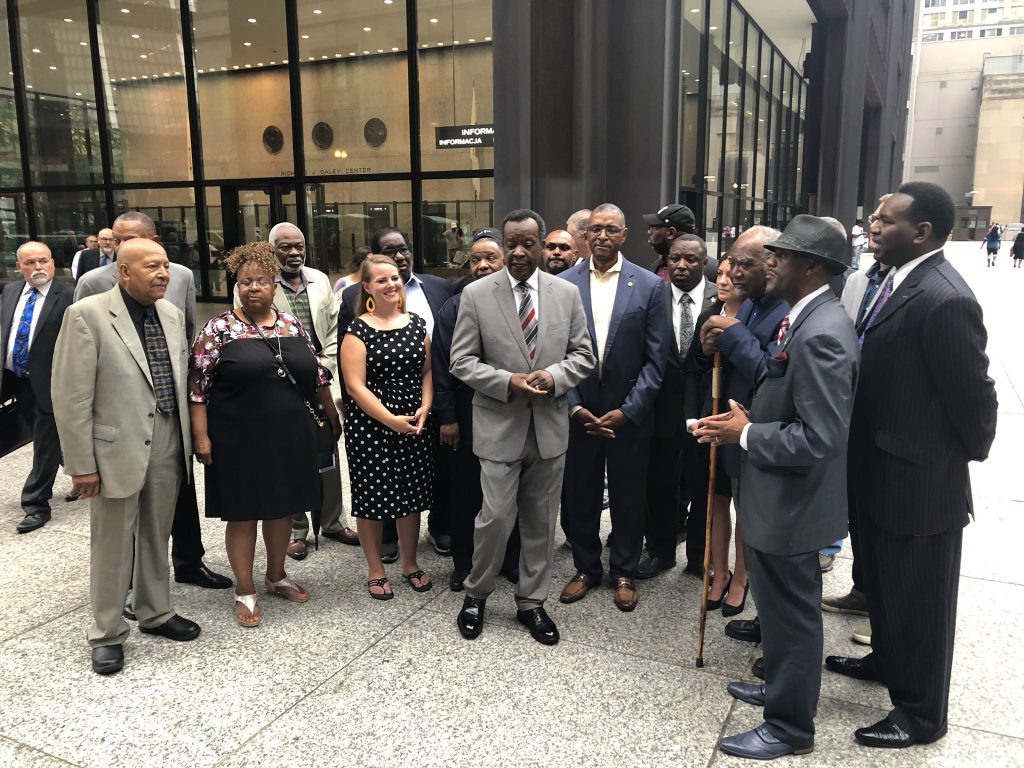 Former Cook County Comm. Richard Boykin formally launches his bid to replace retiring Cook County Circuit Court Clerk Dorothy Brown. [Alex Nitkin/The Daily Line]
Former Cook County Comm. Richard Boykin formally launches his bid to replace retiring Cook County Circuit Court Clerk Dorothy Brown. [Alex Nitkin/The Daily Line]Boykin courts Brown supporters in clerk race: ‘They’d like to take this office away from us’
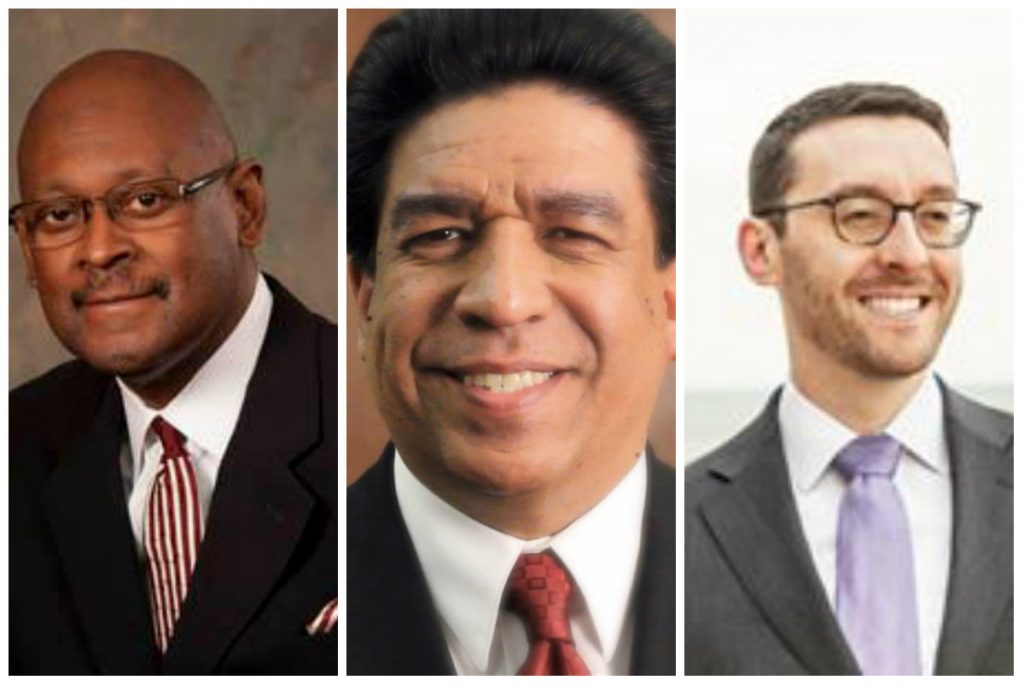 Illinois Supreme Court Justin P. Scott Neville will face Appellate Court Judge Jesse Reyes and attorney Daniel Epstein in the March contest for a 10-year term on the state's highest court. [Submitted]
Illinois Supreme Court Justin P. Scott Neville will face Appellate Court Judge Jesse Reyes and attorney Daniel Epstein in the March contest for a 10-year term on the state's highest court. [Submitted]
During the mid-century heyday of the Cook County Democratic Party, candidates considered a party endorsement the start of a countdown clock to their inauguration.
Those days are gone.
Contenders who were left off the party ticket in three high-profile races during slating last week’s slating event vowed Monday to see their campaigns through to March 17, when Cook County voters will pick a Democratic nominee in each contest.
Their campaigns will seek to exploit the party’s wounded reputation amid a sea of corruption scandals and hone in on the anti-establishment messages that swept Cook County Assessor Fritz Kaegi and then Mayor Lori Lightfoot into office.
‘I’m in it to win it:’ Defiant Democratic candidates shrug off party snub in Supreme Court, county races
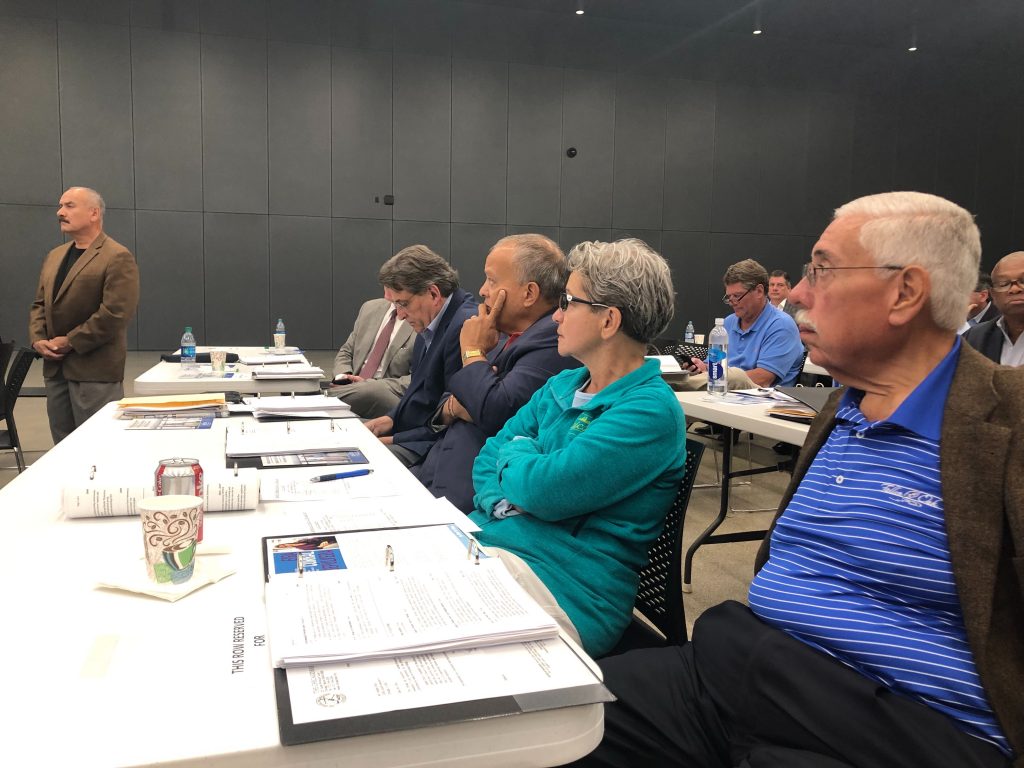
Former Cook County Assessor Joe Berrios, right, and Retired Judge Gloria Chevere, who served as as a proxy for Ald. Roberto Maldonado (26), listen during Friday's slating meeting. [Alex Nitkin/The Daily Line]
Latino candidates were shut out of party endorsements in headline races at the end of Cook County Democrats’ two-day slating session Friday, leaving some members feeling like the county’s 1.3 million Hispanic residents got short shrift on the ballot.
The party’s 80 committeepeople voted on Friday to include three Latinos among 13 candidates who were endorsed to fill vacancies on the Cook County circuit court, and three additional Latinos were endorsed as alternates in case more judgeships open up before Election Day.
Democrats chafe after Latino candidates shut out from top of 2020 slate
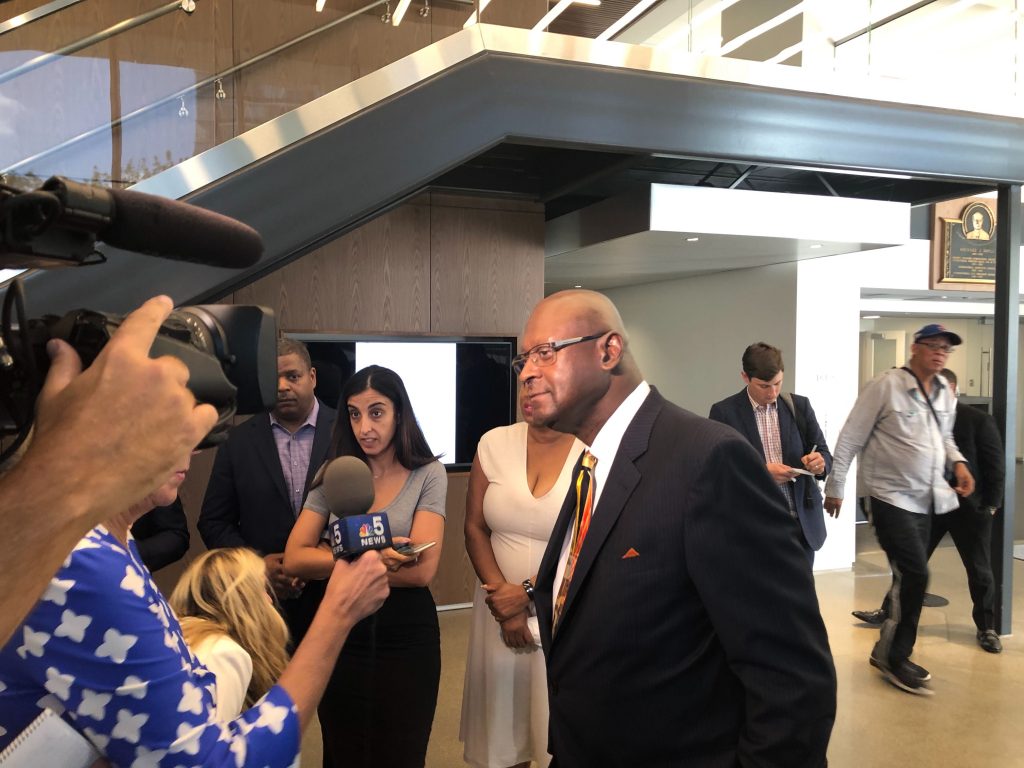 Illinois Supreme Court Justice P. Scott Neville answers reporters questions. [Alex Nitkin/The Daily Line]
Illinois Supreme Court Justice P. Scott Neville answers reporters questions. [Alex Nitkin/The Daily Line]
Cook County Dems put Neville on fast track for Supreme Court endorsement
Cook County Dems look for unified ticket amid early fundraising bonanza
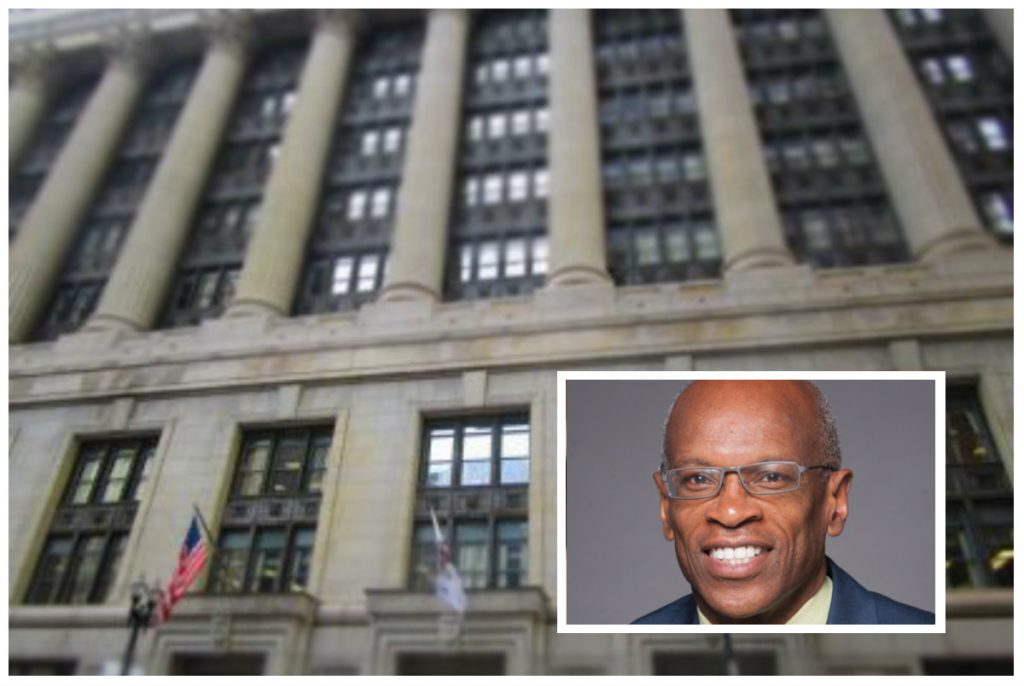
Maurice Cox had only been in Detroit a few months when he declared in 2016 that Motor City would become the “most bike-friendly city in America.”
The promise shocked Todd Scott, executive director of the Detroit Greenways Coalition bike advocacy group. Scott said he was even more surprised when Cox followed through on his promise.
Lightfoot’s pick for Planning Commissioner carries a controversial legacy after 4 years in Detroit
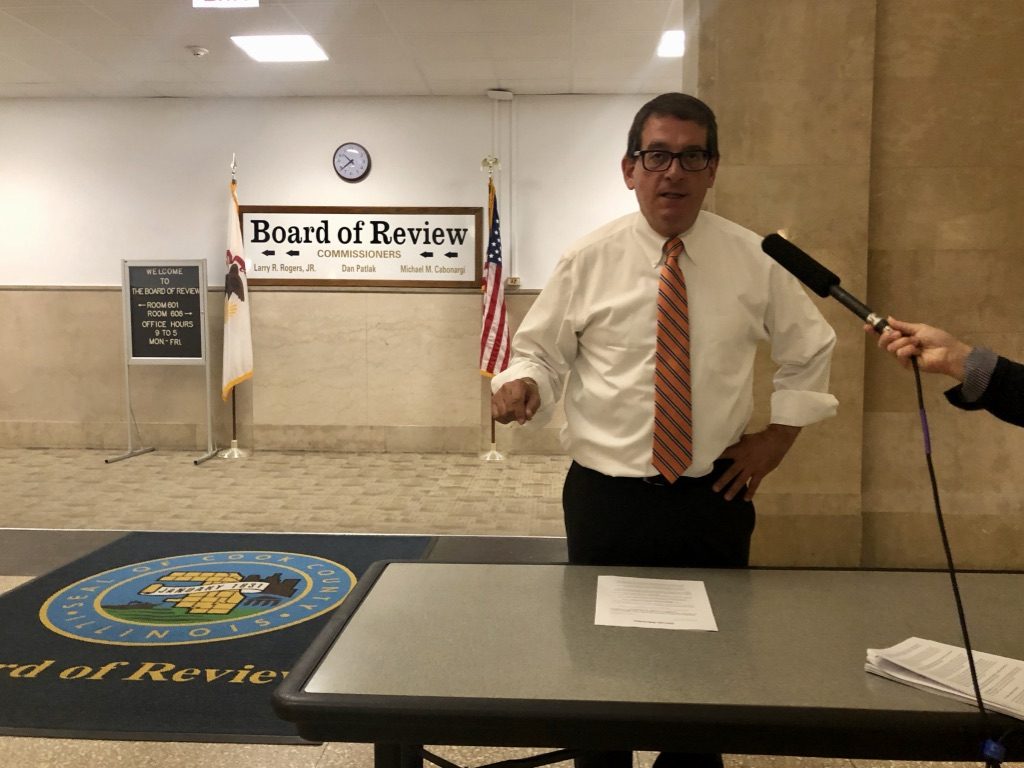 Attorney and Cook County circuit court clerk candidate Jacob Meister held a press conference outside the office of Board of Review commissioner Michael Cabonargi, his rival for the clerk seat, to accuse Cabonargi of ethical conflicts of interest. [Alex Nitkin/The Daily Line]
Attorney and Cook County circuit court clerk candidate Jacob Meister held a press conference outside the office of Board of Review commissioner Michael Cabonargi, his rival for the clerk seat, to accuse Cabonargi of ethical conflicts of interest. [Alex Nitkin/The Daily Line]
Dorothy Brown challenger Jacob Meister urges Cook County Dems not to back Cabonargi
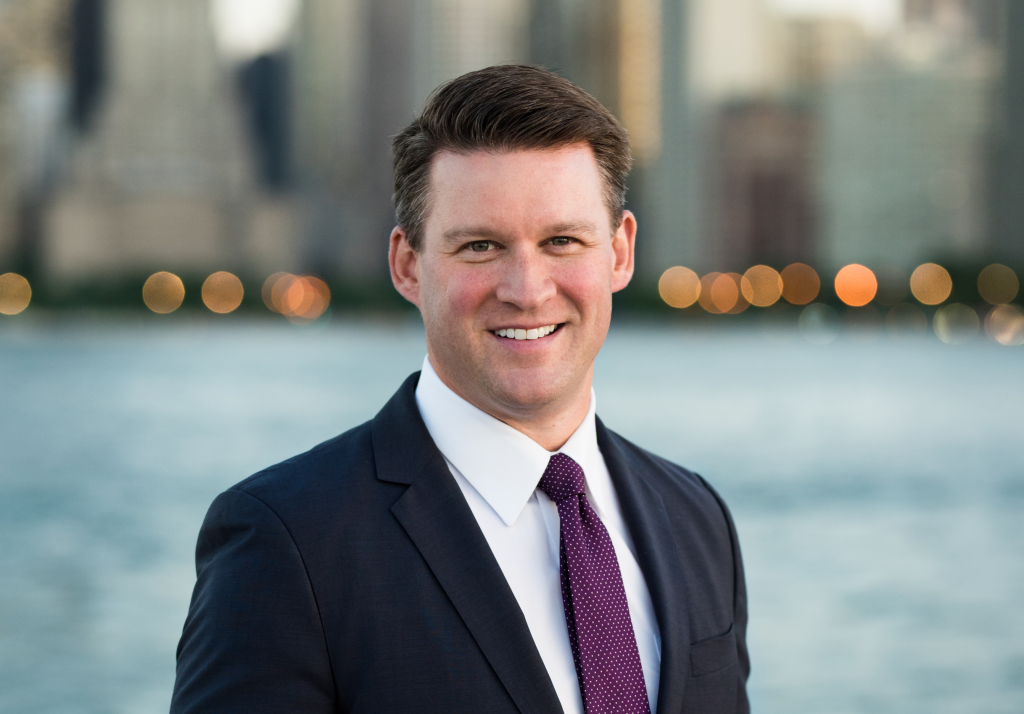 Bill Conway [Submitted]
Bill Conway [Submitted]Foxx challenger Conway to skip Cook County Dem slating, calls for ‘open primary’
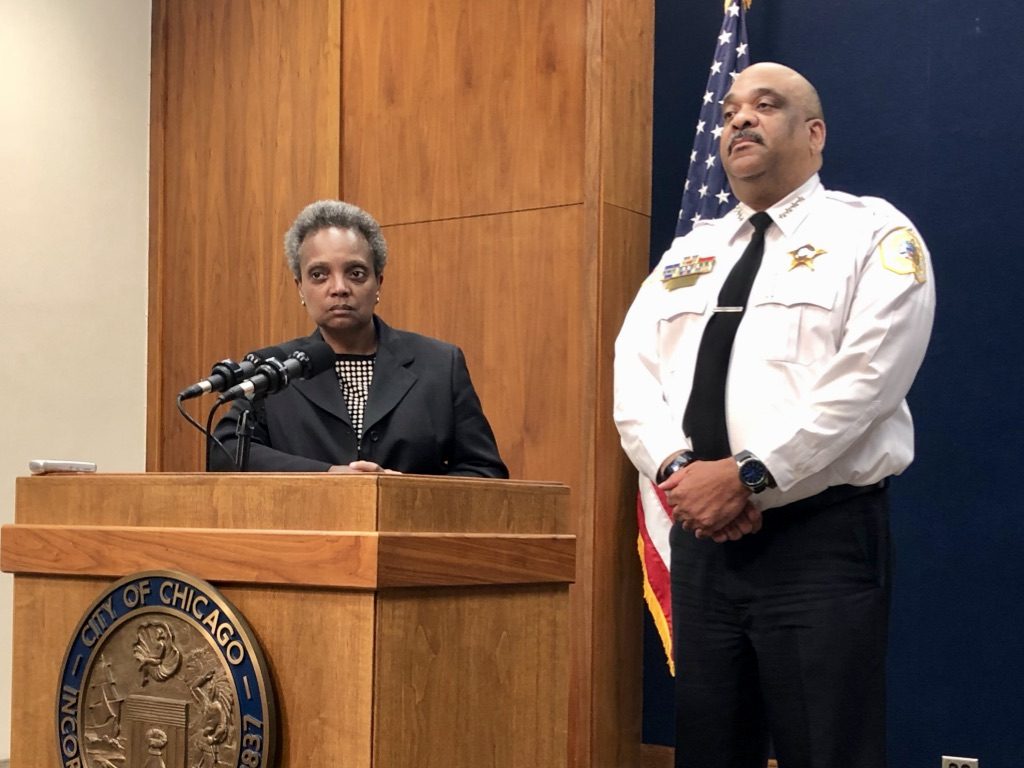 Mayor Lori Lightfoot and Supt. Eddie Johnson shared a photo of assault rifles confiscated by Chicago Police over the weekend to call attention to defendants who are released on bail after being charged in illegal possession of a gun. [Alex Nitkin/The Daily Line]
Mayor Lori Lightfoot and Supt. Eddie Johnson shared a photo of assault rifles confiscated by Chicago Police over the weekend to call attention to defendants who are released on bail after being charged in illegal possession of a gun. [Alex Nitkin/The Daily Line]
Lightfoot doubles down on judges critique after muddling facts on weekend arrest
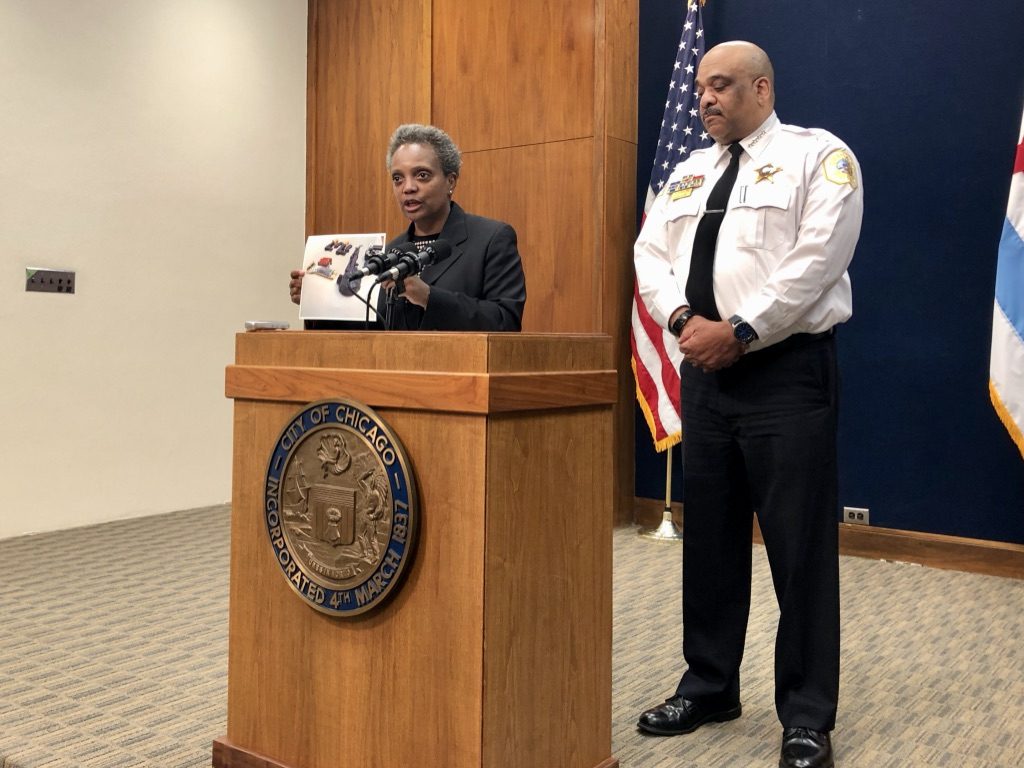 Mayor Lori Lightfoot holds up a photo of assault rifles that Chicago Police say they confiscated on Friday. [Alex Nitkin/The Daily Line]
Mayor Lori Lightfoot holds up a photo of assault rifles that Chicago Police say they confiscated on Friday. [Alex Nitkin/The Daily Line]
Lightfoot blasts lenient judges after deadly weekend: 'This doesn't make any sense to me'
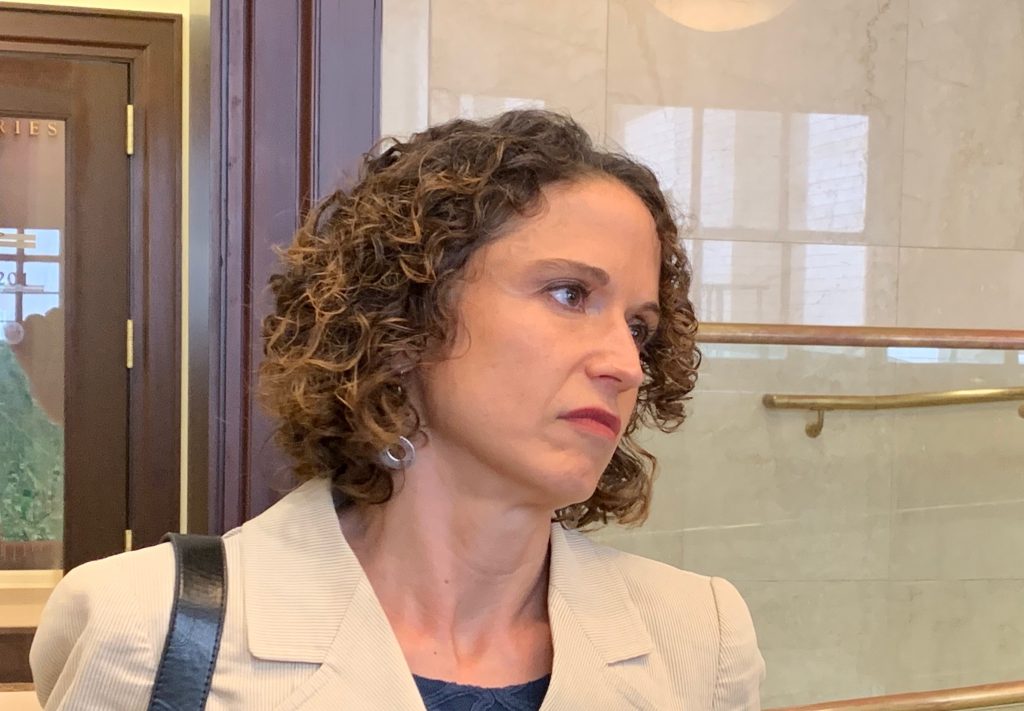 Acting Housing Commissioner Marisa Novara listens to affordable housing advocates after her confirmation hearing. [Heather Cherone/The Daily Line]
Acting Housing Commissioner Marisa Novara listens to affordable housing advocates after her confirmation hearing. [Heather Cherone/The Daily Line]City to spend $12M on affordable housing in ‘initial step’ for Lightfoot housing agenda
Bio
Solutions reporter, @IllinoisAnswers/@BetterGov. Formerly of @thedailylinechi, @trdchicago & @DNAinfoChi. Amateur baker. Tips: [email protected]









